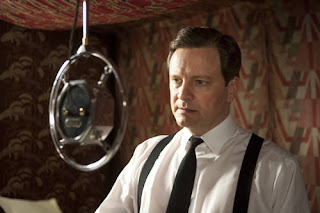I haven’t watched the Oscars for years, but Sunday our family spent a little time volunteering at Out North and then staying to attend their amazingly fun Academy Awards show-watching party. I was the one on the floor in the front, clapping like crazy for ‘The King’s Speech.’ Every few years, I read or see something that makes me think, ‘What a perfect and amazingly humane story. Who discovered this wonderful plot? I’ll never be able to write anything as good as that’ — a curious mixture of envy and gratitude and astonishment for incredible storytellers like David Seidler, the 73-year-old charmer and “late bloomer” who won the award for best screenplay.
I’m giving myself 48 hours of permission to have a little crush on this older Jewish playwright/ screenwriter and former stammerer, whose own speech impediment started when he was 3 years old and bound for the U.S. in a convoy of three ships, one of them sunk by U-boats. (Who wouldn’t stammer after that?)
I love that he managed to rise to this level of accomplishment in Hollywood, a city of youth and celeb beauty, where his first project was the film ‘Tucker’ — another story about an unusual individual trying to rise against the odds. I also love the story of how this movie came to be (nearly all the facts on Siedler in this post come from Wikipedia, because until Sunday night, not all that much had been written about him though I’m sure that will change quickly).
Seidler discovered the obscure storyline of this king’s speech therapist in the 1970s, was asked to get the Queen Mum’s permission to tell it (a condition made by the grandson of Logue, the real therapist), and didn’t receive it. The Queen Mum died in 2002; Seidler started again in 2005, inspired by a bout with throat cancer.
It was Seidler’s wife who suggested he write the story first as a play, in order to avoid the cinematic challenges and perhaps distractions of writing it into screenplay form. And perhaps that’s what we’re seeing in the final project: an intense focus on character and pitch-perfect dialogue, developed for the ‘physical confines of the stage.’ (Playwrights be proud!) Which only goes to show that if you have a great story, use whatever genre and tools that will help you tell it best. You never know where it will go from there.
As Helena Bonham Carter gushed at the awards ceremony, she can usually tell which type of fan will like which films she has done, but this is one that has attracted fans of all ages and crossed cultures.
Oh yes. That other F-bomb. Much was made of Melissa Leo’s accidental cursing after receiving her Oscar. At the age of 16, after other forms of speech therapy had failed him, Seidler vented his rage by using the F-word. Evidently, it helped; he got a role in a school play two weeks later. (And we see the re-use of that idea in the final movie). Which just goes to show: so much is made of the occasional curse word, but sometimes no other word will do.


On CBC's program "Q" a delightful interview with Mr. Seidler talked about his efforts to rid the impediment and the years spent waiting to write the story. (The Queen Mum asked him not to. SO he waited 28 years until her death.) And he talked about age discrimination for writers. Worth a listen on the Q Archive.